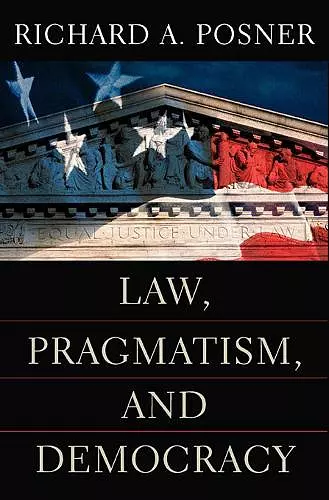Law, Pragmatism, and Democracy
Format:Paperback
Publisher:Harvard University Press
Published:30th Nov '05
Currently unavailable, our supplier has not provided us a restock date

Judge Posner offers a vigorous and extended contemporary elaboration of Churchill's aphorism that democracy is the worst form of government except for all the others. He surveys much recent literature on the subject, and as might be expected, he does not favor high-minded participatory and deliberative versions of democratic theory. But overall his is a much more robust defense of existing democratic institutions than has been usual in recent work by those who view politics from the perspective of economics and public choice theory. He also expands in an interesting way on the important pragmatic account of adjudication developed in his earlier writings. The book represents a provocative and readable stretch of the authors ongoing reflections on the intellectual scene: the economist/jurist/judge at the breakfast table. -- Thomas Grey, Stanford Law School This hook is sure to provoke attention to the topic of democratic theory. Among the book's many strengths are the discussions of pragmatism, philosophical and everyday; Dewey on democracy, experimentalism, and distributed intelligence; Schumpeter on democracy; John Marshall's greatness; Kelsen's legal theory and, to a lesser extent because it is a lesser theory, Hayek's legal theory; and the anti-trust theory of judicial decision on the democratic process. These seemingly disparate topics belong together so well that the book sustains reading straight through, as is seldom true of academic works. -- Russell Hardin, Stanford University
Posner argues for a conception of the liberal state based on pragmatic theories of government. He emphasizes the institutional and material, rather than moral and deliberative, factors in democratic decision making. Posner argues that democracy is best viewed as a competition for power by means of regular elections.
A liberal state is a representative democracy constrained by the rule of law. Richard Posner argues for a conception of the liberal state based on pragmatic theories of government. He views the actions of elected officials as guided by interests rather than by reason and the decisions of judges by discretion rather than by rules. He emphasizes the institutional and material, rather than moral and deliberative, factors in democratic decision making.
Posner argues that democracy is best viewed as a competition for power by means of regular elections. Citizens should not be expected to play a significant role in making complex public policy regarding, say, taxes or missile defense. The great advantage of democracy is not that it is the rule of the wise or the good but that it enables stability and orderly succession in government and limits the tendency of rulers to enrich or empower themselves to the disadvantage of the public. Posner’s theory steers between political theorists’ concept of deliberative democracy on the left and economists’ public-choice theory on the right. It makes a significant contribution to the theory of democracy—and to the theory of law as well, by showing that the principles that inform Schumpeterian democratic theory also inform the theory and practice of adjudication. The book argues for law and democracy as twin halves of a pragmatic theory of American government.
This elegant analysis of democratic theory, by a judge on the United States Court of Appeals for the Seventh Circuit in Chicago, argues for a legal pragmatism that pays greater attention to the consequences of what we do than to abstract principle. * New York Times Book Review *
Posner is very convincing when he describes how the American political system actually works, how the federal courts actually function, and how public opinion and elections begin to play a role only when the political elites have made a mess of things. This book is one of his best—vigorously argued and written with wit and panache… He is a genuinely original thinker, as well as a prodigy of learning. Able to draw upon an amazingly broad range of reading, he resists stereotypes and allegiances, and goes his own way. -- Richard Rorty * Dissent *
Judge Posner’s book makes a valuable contribution to an expanded understanding of the tense yet mutually reinforcing interaction of law and democracy. -- Arthur Jacobson and John McCormack * International Journal of Constitutional Law *
Posner…presents a brilliant defense of the manner in which Americans organize and operate their government… This book is to be read and reread if one is to understand the intricacies of American constitutional democracy. -- R. J. Steamer * Choice *
Judge Posner offers a vigorous and extended contemporary elaboration of Churchill’s aphorism that democracy is the worst form of government except for all the others. He surveys much recent literature on the subject, and as might be expected, he does not favor high-minded participatory and deliberative versions of democratic theory. But overall his is a much more robust defense of existing democratic institutions than has been usual in recent work by those who view politics from the perspective of economics and public choice theory. He also expands in an interesting way on the important pragmatic account of adjudication developed in his earlier writings. The book represents a provocative and readable stretch of the authors ongoing reflections on the intellectual scene: the economist/jurist/judge at the breakfast table. -- Thomas Grey, Stanford Law School
This book is sure to provoke attention to the topic of democratic theory. Among the book’s many strengths are the discussions of pragmatism, philosophical and everyday; Dewey on democracy, experimentalism, and distributed intelligence; Schumpeter on democracy; John Marshall’s greatness; Kelsen’s legal theory and, to a lesser extent because it is a lesser theory, Hayek’s legal theory; and the anti-trust theory of judicial decision on the democratic process. These seemingly disparate topics belong together so well that the book sustains reading straight through, as is seldom true of academic works. -- Russell Hardin, Stanford University
- Nominated for David and Elaine Spitz Prize 2005
ISBN: 9780674018495
Dimensions: 235mm x 156mm x 27mm
Weight: unknown
416 pages